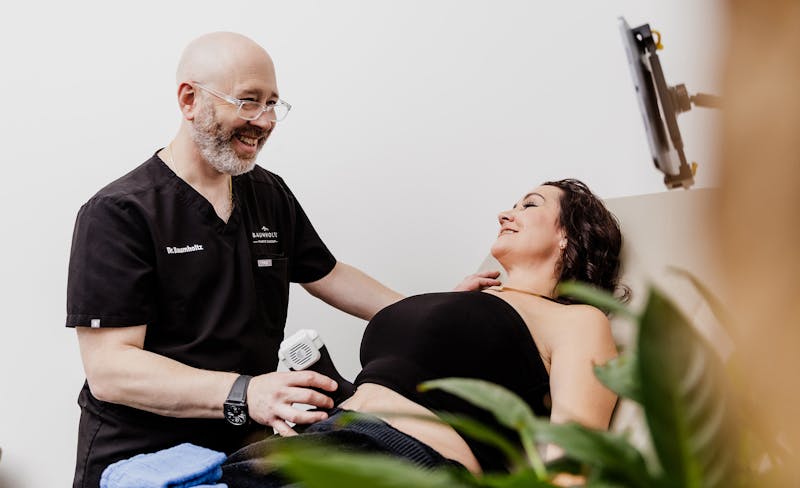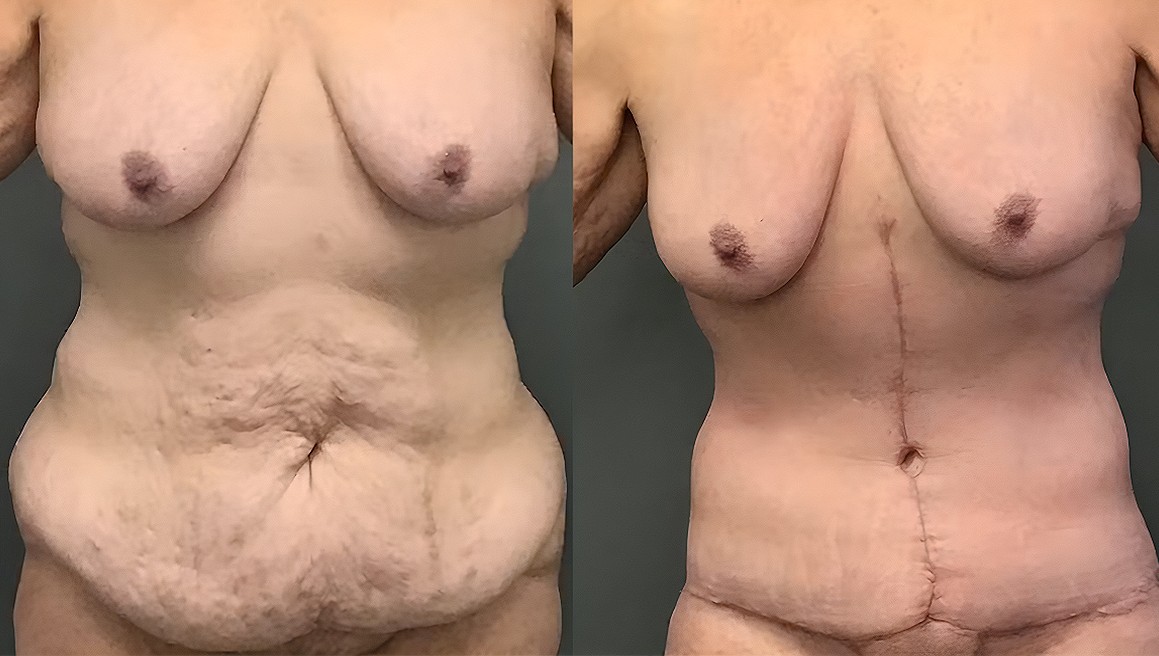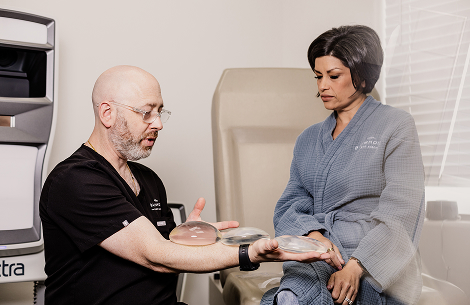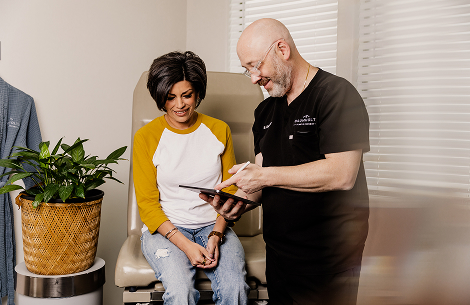
"Do I really have to lose weight before surgery?" It's a question we hear often at Baumholtz Plastic Surgery in San Antonio, TX. And it’s a fair one, because making the decision to undergo plastic surgery is deeply personal, and the road to the operating room should feel empowering, not frustrating.
I'm Dr. Michael Baumholtz, a board-certified Plastic Surgeon here in San Antonio. I want to walk you through why weight loss can be an essential part of your surgical preparation and, more importantly, how to approach it in a way that supports your health and enhances your results.
Your Safety Comes First
Losing weight before surgery isn’t about fitting into a mold. It’s about creating the safest surgical environment possible. Carrying excess weight increases the chance of complications, including infections, delayed healing, and even difficulties during anesthesia. Fatty tissue receives less blood flow, which slows down the healing process and makes it easier for bacteria to cause problems at surgical sites.
A healthier weight also makes anesthesia safer and more predictable. It’s easier to manage airways, maintain proper breathing, and keep vital signs stable throughout your procedure. For patients with conditions like high blood pressure or sleep apnea, weight loss can dramatically reduce the risks involved with being under anesthesia.
Moreover, weight loss improves circulation, boosts immunity, and reduces systemic inflammation. This means your body is better equipped to heal efficiently and avoid post-op complications like blood clots or excessive scarring. At my San Antonio practice, I place your safety above all. A prepared, healthy body leads to a smoother recovery and a better outcome.
Your Results Last Longer
Surgical outcomes are more than just what happens in the operating room. They're about how well those results hold up over time. When you enter surgery at a stable and healthy weight, the changes we make to your body are more likely to stay put. Think of it as laying a solid foundation before you build something beautiful.
A steady weight allows me to sculpt more precisely, especially in procedures like tummy tucks, liposuction, or breast lifts. Skin responds better to changes when it's not overstretched or under constant fluctuation. Plus, maintaining your weight post-op helps preserve the results, so you're not back in my office a year later asking about a revision.
When your body stays consistent, so do your results. This is why I encourage patients to reach a maintainable weight, not a perfect one, before we operate. You’re investing time, money, and trust into this process. Let’s make sure it lasts.
See Before and After Photos of Body Contouring Surgery
It’s Not About Perfection, It’s About Preparation
There’s a misconception that the goal is to be “thin enough” or hit an ideal number. That’s not what this is about. As your Plastic Surgeon, I’m not here to impose an image on you. I’m here to help you reach your personal goals in a safe and sustainable way.
If you’ve been told to lose weight before surgery, it doesn’t mean you’re a bad candidate. It means we want the very best for you, health-wise and results-wise. This is about preparing your body for success, minimizing risk, and giving you a recovery that feels empowering, not overwhelming.
I work with my patients here in San Antonio to design tailored weight goals that match their lives. We consider your health history, lifestyle, and even your emotional wellness. We’re not chasing perfection. We’re building a safe path toward your transformation together.
How Much Weight Do You Need to Lose?
This is one of the most common questions, and the answer varies. For some women, losing as little as 5% to 10% of their body weight can significantly reduce surgical risks and improve outcomes. That might be 10 or 20 pounds—an achievable goal for many. It’s important to remember that diet typically has a greater impact on weight loss than exercise, so focusing on nutritional changes can be especially effective.
We use BMI as a guideline to help assess your current health status and anticipate how your body may respond to surgery. Generally, the relationship between BMI and surgical risk is linear up to a BMI of 30–34. However, at a BMI of 35, the risk begins to increase exponentially, and at 37 or higher, the risk becomes significantly elevated. If you have underlying conditions such as diabetes or hypertension, even modest weight loss can improve management of these conditions, contributing to safer anesthesia and better healing outcomes.
My goal isn’t to hand you a number. It’s to help you find a weight range where your body feels strong, steady, and ready for what’s ahead. During your consultation, we’ll discuss all this in detail so you’re informed, empowered, and prepared.
Smart, Sustainable Strategies for Weight Loss
Weight loss before surgery doesn’t mean jumping into fad diets or punishing exercise routines. It’s about realistic, healthy changes that support your body’s natural systems.
Start by speaking with your primary care doctor, especially if you have chronic health conditions. With a personalized plan, you can safely lose weight in a way that supports your full health picture.
Nutritionally, focus on whole foods. Think lean proteins like chicken or tofu, colorful vegetables, whole grains, and healthy fats such as avocados and nuts. Steer clear of restrictive diets that promise quick results but leave you feeling drained.
Regular movement is key, even if it’s just walking a few times a week or doing gentle yoga. You don’t need to hit the gym every day. What matters is consistency. Movement helps with metabolism, mood, and inflammation control.
And don’t underestimate hydration and sleep. Drinking water supports digestion and helps regulate hunger, while quality sleep plays a huge role in weight balance. If you can, track your meals, habits, and progress with an app or journal. It’s not about micromanaging. It’s about staying connected to your goals.
This isn’t about transforming overnight. It’s about creating momentum and building habits you’ll carry into your recovery and beyond.
When the Journey Gets Tough
Let’s be honest, weight loss isn’t easy, and the process isn’t always linear. Many patients hit plateaus, face setbacks, or struggle with motivation. You might be managing family, work, stress, or emotional challenges, all of which can affect your progress.
If this happens, you’re not alone. Plateaus are common. Your body may simply be adjusting. Sometimes, reassessing your eating plan, sleep schedule, or stress levels can reignite your progress. Emotional health matters just as much as physical readiness. High stress levels and poor sleep can throw off your metabolism and increase cravings.
What’s important is that you don’t see a stall as a failure. Instead, think of it as part of the process. We’ll revisit your plan, tweak what’s not working, and keep going. As your Plastic Surgeon, I’m not here to rush you. I’m here to support you. When you’re ready, we’ll proceed together.
What Makes My Approach Different
At Baumholtz Plastic Surgery in San Antonio, we take a different approach. I believe in open communication, safety-focused care, and long-term results. As a dual board-certified Plastic Surgeon, I stay personally involved in every case, from consultation through follow-up.
You’ll always meet with me directly. We’ll talk through your questions, your goals, and your concerns in detail. I won’t hand you a generic plan. I’ll tailor one just for you, your health, your timeline, your results.
When you choose my practice, you’re not just choosing surgery. You’re choosing a partnership, one that puts your safety, comfort, and satisfaction first.
FAQs About Losing Weight Before Plastic Surgery
What happens if I don’t lose the recommended weight before surgery?
Surgery might be postponed until your body reaches a healthier and safer range. This is not a penalty, but a measure to minimize risks and enhance your recovery and results. Even small weight changes can have a significant positive impact. While surgery may still be possible - and sometimes safe - at higher weights, the outcomes are often less optimal.
Can I still have surgery if I’ve been overweight most of my life?
Yes, many patients have long-term weight struggles. We’ll assess your individual health, not just your weight history, to determine what’s safe and achievable.
What if I gain weight back after surgery?
Significant weight gain can affect your results, especially with contouring procedures. That’s why we focus on sustainable changes before surgery, and we’ll help you plan for long-term maintenance.
Do I have to be at my “goal weight” to qualify for surgery?
No. You don’t need to be at your lowest weight, just at a stable, healthy place that supports healing and safety for about 4 to 6 months. This looks different for everyone.
I’ve hit a plateau and can’t lose more weight - now what?
That’s common, and it doesn’t mean you’re out of options. We’ll evaluate your readiness and may still proceed if your overall health supports a safe outcome.
Will you help me with a weight loss plan?
Yes. I often collaborate with primary care doctors or nutritionists to ensure you're supported. We can also recommend resources specific to San Antonio for healthy living. For some patients, newer tools like GLP-1 medications (such as semaglutide or tirzepatide) may be an option - they work by helping regulate appetite and improve metabolic function. Others have found success with intermittent fasting, which focuses more on when you eat rather than what you eat. Both approaches can be effective when guided properly, and we’re happy to help you explore what might work best for your situation.
How long do I need to maintain my weight before surgery?
Ideally, at least several weeks of stable weight are recommended. This shows us your habits are sustainable and gives your body time to adjust before recovery.
Medical References
- Effect of weight‐loss diets prior to elective surgery on postoperative outcomes: a systematic review - National Institutes of Health (PMC)
https://pmc.ncbi.nlm.nih.gov/articles/PMC9286439/ - Evaluation of the weight loss patient presenting for plastic surgery consultation
https://pubmed.ncbi.nlm.nih.gov/23190820/
Ready to Take the Next Step?
If you’re considering plastic surgery and wondering how weight loss fits into the picture, let’s talk. Whether you’re just starting your journey or you’re close to your goal, I’m here to help you move forward in a way that feels safe, supported, and right for you.
Visit www.baumholtzplasticsurgery.com to schedule a consultation or learn more about our approach. In San Antonio, women trust Dr. Michael Baumholtz for compassionate, expert surgical care, and I look forward to helping you on your path.
Further Reading
- Read more about Body Contouring Post Weight Loss
- View Dr Baumholtz Procedure Gallery






